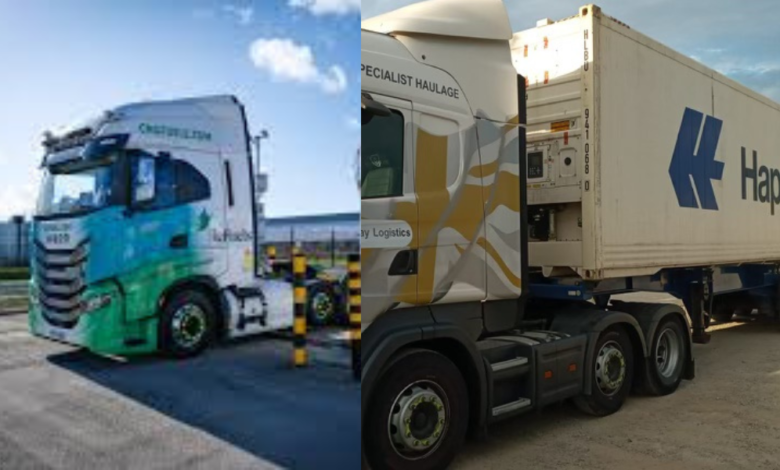Haulage Companies: The Backbone of the Transport Industry

Haulage companies play an essential role in the global economy, ensuring the smooth and efficient movement of goods across vast distances. Whether it’s heavy machinery, construction materials, or everyday consumer products, haulage companies are the unsung heroes that facilitate the supply chain, helping businesses meet their demands and consumers access the products they need. This article delves into the importance of haulage companies, their key services, types of haulage, and how they operate in the modern transportation industry.
Understanding Haulage Companies
A haulage company is a business that specializes in the transportation of goods, often using large trucks or lorries. These companies handle everything from local deliveries to international freight, depending on the services they provide. In the UK, for instance, haulage refers to the transportation of goods over land, primarily via road, though companies may also operate across different modes of transportation like rail or sea.
The scope of haulage services is vast, ranging from the transportation of bulk items to fragile goods that require special handling. The key focus of a haulage company is to provide safe, reliable, and cost-effective transportation solutions for businesses of all kinds.
The Role of Haulage Companies in the Supply Chain
Haulage companies are an integral part of the supply chain. They ensure that raw materials, products, and goods reach their destinations, from manufacturers to retailers or consumers. This connection between producers and consumers is vital for maintaining the flow of commerce. Whether the goods are perishable, valuable, or oversized, haulage companies possess the expertise and equipment necessary to transport them safely and efficiently.
For instance, a construction company may need a haulage company to transport heavy materials like cement, steel beams, and machinery to construction sites. Similarly, retailers rely on haulage services to stock their shelves, ensuring that products arrive on time and in excellent condition. Without these companies, industries would face significant challenges in maintaining their production and distribution schedules.
Types of Haulage
Haulage companies typically offer a range of services depending on their area of expertise. Some of the common types of haulage include:
- Road Haulage: Road haulage is the most common form of transportation for goods. Haulage companies use large trucks or lorries to move goods from one place to another, either locally or internationally. Road haulage is popular because it provides flexibility, allowing goods to be transported directly from the source to the destination, without the need for additional handling or transfers.
- Heavy Haulage: Heavy haulage is a specialized branch that focuses on transporting oversized, overweight, or high-value items. This can include machinery, industrial equipment, and large construction materials. Heavy haulage requires specially designed vehicles, as well as careful planning to navigate roads, bridges, and other infrastructure that may have weight or size limitations.
- Freight Forwarding: Freight forwarding companies work closely with haulage businesses to manage the logistics of transporting goods across borders and various modes of transport, including road, rail, air, and sea. These companies handle the complex documentation, customs procedures, and scheduling to ensure that goods reach their destination on time and within budget.
- Container Haulage: Container haulage is the transportation of shipping containers, typically from ports to inland destinations. Container haulage companies handle the transportation of containers filled with goods, ensuring they are securely transported and unloaded at their destination. This type of haulage is critical for international trade, especially for businesses that rely on importing and exporting goods.
- Refrigerated Haulage: Also known as “chilled haulage,” refrigerated haulage involves the transportation of perishable goods, such as food, medicine, and other temperature-sensitive products. Haulage companies operating in this niche market use refrigerated trucks or containers to maintain the required temperature for goods, ensuring they remain fresh and safe for consumption.
- Bulk Haulage: Bulk haulage involves the transportation of goods that are not packaged in containers but instead are transported in large quantities, often loose. This could include materials like grains, chemicals, coal, and sand. Bulk haulage requires specific vehicles, such as tankers or open-top trailers, designed for easy loading and unloading.
How Haulage Companies Operate
Haulage companies operate on a simple yet complex framework. They handle logistics, transport, and often even storage of goods. Here’s a breakdown of how these companies typically work:
- Booking and Planning: Once a customer places an order for goods to be transported, the haulage company will assess the load’s size, weight, and destination to determine the best transportation solution. This involves choosing the appropriate type of vehicle, route, and time schedule.
- Loading and Transport: Haulage companies work closely with warehouses, manufacturers, and suppliers to load goods onto their vehicles. The loading process is crucial for ensuring that goods are safely and securely packed, reducing the risk of damage during transit. After the goods are loaded, they are transported to their destination via the chosen route.
- Tracking and Monitoring: Many haulage companies now utilize advanced tracking systems that allow customers to monitor the progress of their goods during transit. This provides transparency and helps customers plan for the arrival of their goods, reducing uncertainty and improving overall satisfaction.
- Unloading and Delivery: Once the goods reach their destination, they are unloaded and delivered to the specified location. Haulage companies may also offer additional services such as storage or unloading assistance, depending on the agreement.
The Challenges Faced by Haulage Companies
While haulage companies play a vital role in ensuring the smooth flow of goods, they also face several challenges that impact their operations. Some of the key challenges include:
- Rising Fuel Costs: Fuel costs have a significant impact on the profitability of haulage companies. As fuel prices fluctuate, companies are forced to adjust their pricing and look for ways to optimize fuel consumption.
- Regulatory Compliance: Haulage companies must comply with a range of regulations, including road safety laws, environmental standards, and international customs requirements. These regulations are essential for ensuring the safety and efficiency of transportation, but they also create administrative burdens for companies.
- Driver Shortages: The haulage industry is currently facing a shortage of qualified drivers, a situation that has been exacerbated by the COVID-19 pandemic and Brexit in the UK. The lack of skilled drivers can lead to delays, increased competition for available labor, and higher wages, which further affect profitability.
- Traffic Congestion: Traffic congestion is a common issue for haulage companies, especially in urban areas. Heavy traffic can lead to delays, increased fuel consumption, and additional costs. Haulage companies must carefully plan their routes and schedules to avoid congested areas and minimize delays.
- Environmental Concerns: With increasing environmental awareness, haulage companies are under pressure to reduce their carbon footprint. This has led to a push towards more sustainable transport options, such as electric trucks, hybrid vehicles, and fuel-efficient technologies. However, these alternatives can be costly to implement and may require significant investment.
The Future of Haulage Companies
As the world becomes more interconnected, haulage companies will continue to play an essential role in facilitating trade and commerce. However, the industry is undergoing significant changes due to technological advancements, environmental concerns, and shifting consumer demands.
- Automation and Technology: The advent of autonomous trucks and AI-driven logistics is poised to revolutionize the haulage industry. These technologies promise to reduce human error, improve safety, and increase efficiency in transport operations. However, widespread adoption is still in its early stages, and there are challenges to overcome, such as regulatory approval and safety concerns.
- Sustainability: Sustainability will become increasingly important for haulage companies as governments and consumers demand greener solutions. Companies are already exploring electric and hybrid trucks, biofuels, and renewable energy sources to reduce their carbon footprint and improve their environmental performance.
- Digitalization: The digital transformation of the haulage industry is ongoing. From automated tracking systems to digital freight matching platforms, technology is making it easier for haulage companies to connect with customers and optimize their operations. As more companies embrace digital solutions, the industry will become more efficient, transparent, and customer-centric.
Conclusion
Haulage companies are the backbone of the transportation and logistics industry. They provide essential services that enable businesses to move goods efficiently and safely across vast distances. From road haulage to bulk and heavy transport, these companies are vital in maintaining the smooth flow of goods worldwide. Despite facing numerous challenges, such as rising fuel costs, regulatory compliance, and driver shortages, haulage companies continue to evolve, embracing new technologies and sustainability practices to meet the demands of an ever-changing market.



